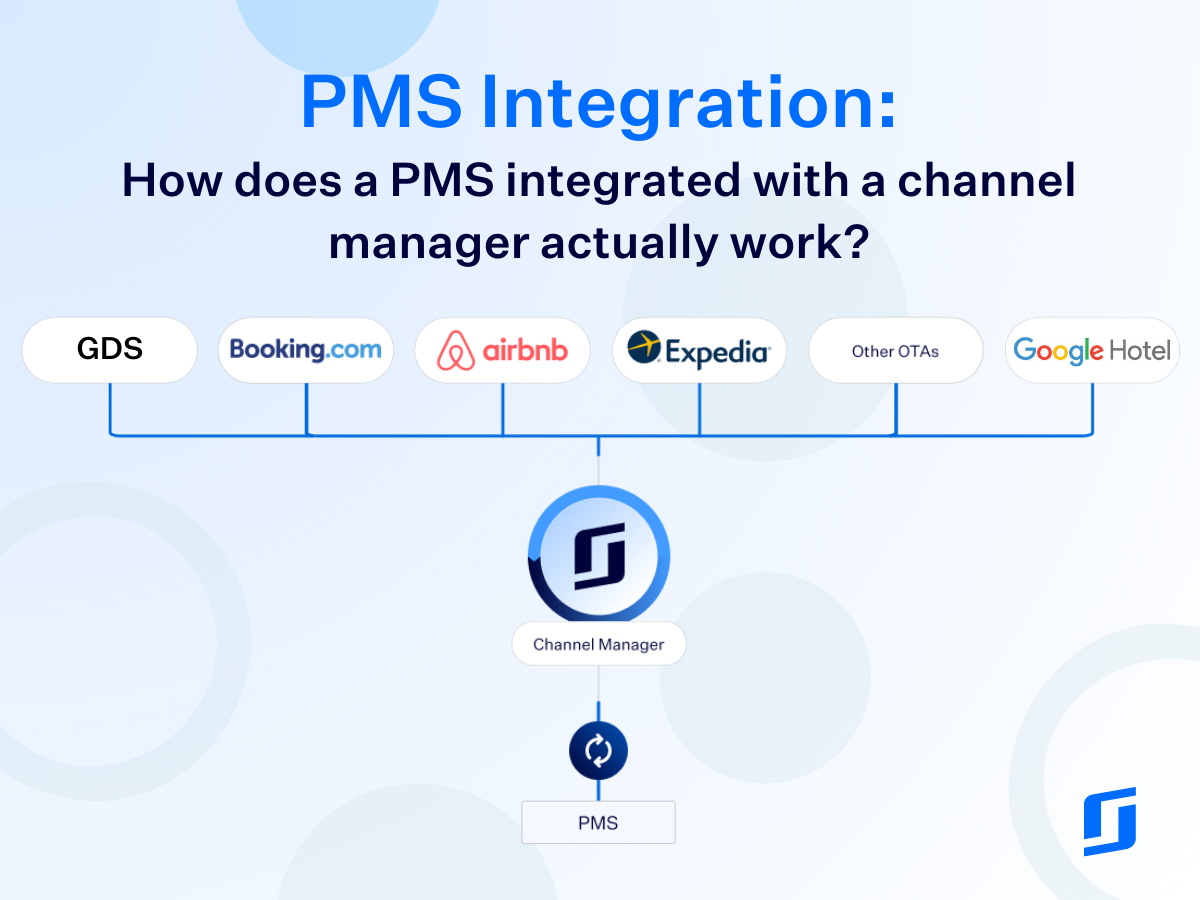What is PMS integration?
PMS integration is the capability of a property management system to connect with existing hotel software and vice versa. PMS integrations enable other hotel systems such as a channel manager, booking engine, or payment gateway to operate seamlessly with the PMS.
In this blog, we’ll cover everything you need to know about PMS integration, exactly how it works, and how hotels can easily integrate their PMS with other essential hospitality software.
Table of contents
Why is integration capability important for PMS software?
Connecting your property management system with other software is important because your PMS is the lifeblood of your hotel.
The PMS interface controls, automates, and accelerates a huge range of operational procedures. Its power is magnified when you integrate it with other solutions to create an entirely cloud-based hub to run your business.
1. PMS integrations simplify hotel reservations
Property management system integration is an essential tool for hotels who want to stay competitive in the massive digital marketplace. Hotel bookers now have access to vast amounts of information through search engines, comparison websites, and online travel agencies (OTAs like Booking.com, Expedia, and Airbnb).
Accommodation providers list their room inventory and rates on as many OTAs as possible to increase their chances of attracting potential guests.
Until now, hotels have been limited by the time and effort it takes to manually manage multiple online channels.
New distribution technology is freeing up hotel resources, allowing hoteliers to concentrate on broadening their market reach by integrating their PMS or Central Reservation System (CRS).
2. PMS integrations streamline hotel operations
Hotel PMS integration solutions enable the convergence of essential departments such as sales, front desk management, payment processing, and revenue management.
With seamless integration, sales teams can accurately forecast demand based on real-time occupancy data, while front desk staff can efficiently manage check-ins and check-outs without manual data entry errors.
Payment processing becomes more secure with integrated solutions, reducing the risk of fraud. Revenue management benefits from access to comprehensive data on room rates, allowing for dynamic pricing strategies to maximise revenue.
The ability for your PMS to share relevant information with other internal systems, including data from external channels, doesn’t just eliminate any need for time-consuming manual work on your behalf, but also empowers you to make better business decisions, leading to increased revenue.
Easily implement PMS integrations
Connect your PMS with access to over 1350+ partner integrations and apps to centralise your business in a single platform and boost productivity.
Watch demo
How do PMS integrations work?
PMS integrations work by seamlessly transferring, updating, and displaying data across connected hotel systems. Here is an example of how a two-way integration with a channel manager actually works:
Step 1: PMS integration with channel manager
A channel manager integrated with a property management system builds a link between a hotel’s PMS or CRS and Revenue Management System (RMS), and the hotel’s chosen booking channels which include but are not limited to their own website, OTAs, and Global Distribution System (GDS).
SiteMinder’s hotel channel manager will help increase online revenue, streamline business processes, and reduce cost of guest acquisition. It also integrates with almost 400 property management systems around the world which is more than any other channel manager in the hotel industry.
Step 2: Fast and secure data exchange
Information is then instantly exchanged over this two-way connection from the hotel to online travel agencies (OTAs) such as Expedia, Booking.com, HRS, and Agoda, among others. SiteMinder connects to over 450 OTAs, ranging from global giants like Airbnb to regional niche sites like Mr & Mrs Smith.
Step 3: Auto-updated information across systems
When accommodation is then purchased via one of these online booking websites, the hotel’s PMS updates itself, meaning the days of manually entering each booking are over.
Meanwhile, real-time rates, availability, and restrictions are automatically sent from the PMS to the hotel’s various online channels. Hoteliers can now maximise room inventory and revenue without the fear of overbooking.
SiteMinder users can even manage rate plans, implement stop-sells, and more while on the go using the mobile app.

Why PMS two-way integration matters
Two-way integration with your PMS cuts down the cost of acquisition substantially. For every reservation that is automatically populated, the hotel can then use that time to manage their guests effectively and spend more time on the overall guest experience.
Listed below are what you can expect if you don’t have a channel manager integrated with your PMS:
- Manual distribution of inventory and rates across multiple online channels is extremely time-consuming, prone to errors, and exhausting.
- The process of updating rates and inventory across OTAs is NOT in real-time.
- This definitely gives rise to overbookings.
- There is no guarantee of selling your entire inventory.
Common misconceptions about hotel PMS integrations
Some hoteliers are reluctant to adopt PMS integration software or switch to new systems for fear of losing the processes they already think are working. Many of the assumptions appear to be unfounded. Here’s what we’ve seen:
1. PMS cloud-based integration is confusing or hard to use
Because it’s intangible, some hotel managers believe using cloud-based integrations will be hard to learn and too confusing to keep track of. The opposite is true. In fact, a hotelier even reported that the setup was super easy and that their team quickly learned to navigate the new system.
Cloud-based PMS integrations allow you to keep everything in one place and it can never be lost. You can access your data from any location so long as you have the Internet.
The many tasks that you perform using multiple programs or books can be done from one central location with a fully integrated PMS. This also means you can collaborate better with other staff who need access to the same information.
2. Sensitive data is not secure and vulnerable
While the information in your cloud PMS isn’t kept under lock and key, it is certainly encrypted and backed-up. Nothing is stored ‘onsite’ so even if your computer breaks or your laptop is lost, your data will remain accessible to you.
With secure data in the cloud, you don’t have to worry about viruses or bugs, and hacking is much less likely to succeed thanks to security firewalls and authentication gateways.
For example, SiteMinder is compliant with the General Data Protection Regulation (or GDPR, the toughest privacy and security law in the world) and has PCI DSS certification (Payment Card Industry Data Security Standard, a global set of security policies that protect credit and payment card data and transactions).
3. Current software works just as well as cloud technology
It’s unlikely this is true and even if it is, it won’t be for long. Cloud software, especially like SiteMinder’s hotel platform, is constantly being updated and evolving which means users automatically get the benefits included in their monthly fee.
If your current server isn’t updated, it becomes slow and vulnerable, while updating it requires extra time and greater cost that has to be done too regularly.
4. PMS integrations are only suitable for large hotels
The reality is that smaller or independent hoteliers are often stretched thinner than anyone. With less staff and more responsibility, the time and hassle saved by using a PMS software integration is vital.
It could also be the difference between getting the bookings needed for maximum occupancy or losing revenue on empty rooms.
If you’re a small accommodation provider, then consider trying Little Hotelier, a cloud-based PMS especially built for small hotel managers, property owners, bed and breakfast operators, etc.
5. PMS integrations are too expensive
Cloud-based systems are actually very cost effective. Even a month of using the world’s leading hotel platform with the largest ecosystem of partner integrations costs much less than the average hotel rate per night in Europe.
You never require any additional hardware, backup solutions, licensing, updates, and fixes. There’s also no lengthy setup process and with the time you save using it, more resources can be directed towards increasing guest experience and revenue streams.
There are many other advantages of PMS integration, such as retaining revenue that would otherwise have been lost due to delayed cancellations, and increasing revenue by maximising online exposure with automated inventory and rate updates.
Benefits of PMS full integration vs direct connection
The benefits of integrating your property management system with a channel manager are many, especially surrounding the increase of bookings, reduction of overbookings and double bookings, and improving brand visibility.
You may have seen some PMS software with direct connections to a few OTAs, but they sometimes charge a set-up fee per OTA and connectivity quality may be poor, inevitably leading to overbookings. Particularly in the US, hoteliers can also miss out on key channels that drive a lot of bookings like Airbnb and Hopper.
Let’s look at four major benefits of opting for a full integration between your PMS and a channel manager:
1. Automatically list your rooms on booking channels at the same time
Integrating your PMS with a channel manager updates your rates and availability in real-time across every single channel you list your rooms on. This means that there’s really no restriction on how many and what kind of channels you want to integrate with in order to sell your inventory.
A ‘direct connect’ PMS limits your hotel to a few online travel agencies, unlike a full integration that allows you to connect with not just multiple OTAs, but also valuable channels such as GDS and hotel metasearch like Google Hotels, Tripadvisor, and Trivago.
Automation of inventory and rate distribution across different channels makes the process super quick, accurate, and extremely efficient, while expanding your reach and increasing your revenue.
2. Attract more guests and get ready to be fully booked
Your PMS integration with a channel manager will boost the visibility of your hotel brand. With the ability to connect more channels, you can significantly enlarge the audience and geographies you can capture, and help target the specific guests you want, resulting in more bookings and higher occupancy.
For example, SiteMinder’s channel manager integrates with over 450 OTAs around the world, and you can connect to as many as you want. This puts your property on the global map, and a full integration with your PMS makes sure you can effectively manage all these reservations.
3. Achieve better guest experience by reducing overbookings
Double bookings and overbookings are a big challenge for hoteliers who run their property manually. It’s simply too hard to manage channels and reservations in a timely manner, especially when you have to log into various extranets.
With a full PMS integration, the channel manager and PMS will seamlessly work together to process and update reservations, so you don’t have to log in to each OTA extranet and risk making mistakes. The same applies to cancellations, so any cancelled reservation will be bookable again within a few minutes.
PMS with direct connections tends to not have the same connectivity strength as channel managers because they are primarily meant for property management, not specifically designed for channel management. This can cause unwanted double bookings and eventually, disgruntled guests that negatively affect brand reputation.
A full integration of PMS with a channel manager makes these headaches a thing of the past. Because the stable communication between the systems happens in seconds, hoteliers can rely on the PMS connection, empowering them to improve customer satisfaction and guest loyalty.

